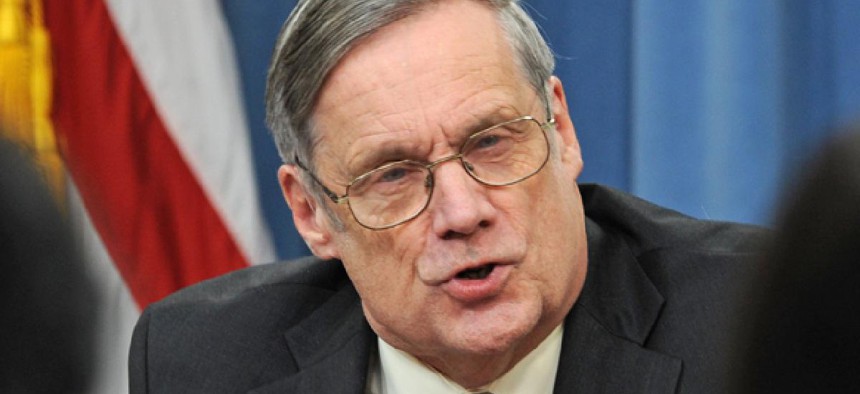
Defense Comptroller Robert Hale Defense Department
Budget request includes TRICARE cut, military retirement details
Proposal increases pay by 1.7 percent, but would slow raises after 2014.
President Obama proposed new TRICARE co-pays and fees, as well as a review of military retirement benefits, in his fiscal 2013 budget unveiled Monday.
The administration provided new details on Defense Department personnel cuts first proposed in January.
The budget includes new TRICARE co-pays, additional increases to TRICARE Prime enrollment fees, initiation of standard and extra annual enrollment fees, and adjustments to deductibles and catastrophic coverage caps.
The budget proposal also modifies pharmacy co-pays to encourage the use of less expensive mail-order and military treatment facility pharmacies, and includes modest annual fees for Medicare-covered beneficiaries older than 65 (TRICARE for Life).
The administration said these changes would save Defense an estimated $12.9 billion in discretionary funding and $4.7 billion in mandatory savings on Medicare-eligible retiree health care over the next five years. It is projected to save the department $12.1 billion over the next 10 years.
Defense implemented TRICARE Prime fee increases for new retiree enrollees beginning in fiscal 2012; under the 2013 proposal, the fees would be phased in based on annual retirement pay.
The TRICARE fee increases mean that military retirees in upper-income tiers would see their health care contributions nearly quadruple over the next five years, Defense Comptroller Robert Hale told reporters Monday. “It’s quite generous compensation compared to private sector plans,” Hale said, adding the department could “revisit” the personnel figures -- which make up $135.1 billion of the fiscal 2013 base budget -- if the economy were to improve.
The proposal includes some good news for military families: It provides $48.7 billion for the Defense Unified Medical Budget to support the Military Health System and $8.5 billion to support the “well-being and psychological health of the military family, ensuring excellence in military children’s education and their development, developing career and educational opportunities for military spouses, and increasing child care,” budget documents said.
The president’s budget proposal provides a 1.7 percent increase to basic military pay in calendar 2013, the full increase authorized by current law.
But the request recommends slowing pay raises after 2014, capping them at 0.05 percent in fiscal 2015, 1 percent in fiscal 2016 and 1.5 percent in fiscal 2017. This idea was first introduced in January in Defense Secretary Leon Panetta’s highlights of the budget.
“If it turns out we can’t attract and retain the people we need in the out years, then we won’t do that,” Hale said. “The big thing is, there’s no pay cuts and no prefreezes so we’re really just slowing the growth in the out years.”
Monday’s proposal does provide a few more details on the department’s recommendation to target military retirement benefits as a source of savings by establishing a commission to review them. According to the administration’s proposal, Defense would transmit to a presidentially appointed commission initial recommendations on how to change the military retirement system; the commission would hold hearings, make final recommendations and draft legislation to implement its recommendation. The president would again weigh in on the commission recommendations and send them to lawmakers. The proposal would also include “grandfathering provisions” for current retirees and active-duty members.
Federal Managers Association President Patricia Niehaus argued that proposed reductions in retirement benefits are “evenly split” between civilian and military retirement programs.”
“By including a 1.7 percent increase in pay for military members in the budget request, President Obama is following in the footsteps of his predecessor and ignoring over two decades of legislative precedent by proposing unequal pay raises for military and civilian federal employees,” Niehaus said in a statement.
“Civil servants and their military counterparts often work side-by-side to ensure the safety of our country,” she added. “We ask the president to reconsider his decision to provide civilian and military employees disparate raises.”
Other groups have suggested the administration’s proposals to cut military costs don’t go far enough. A recent analysis published by the Center for Strategic and Budgetary Analysis suggested that the changes in personnel fees in the department’s fiscal 2013 budget request account for roughly one-ninth of the $487 billion total in reductions it is seeking.
TRICARE for Life alone “is costing us $11 billion a year in the Defense budget. That’s not a small amount of money -- that’s basically enough to buy a new carrier every year,” CSBA senior fellow Todd Harrison told reporters at a Defense budget preview last week.
NEXT STORY: Homeland security spending request holds level






